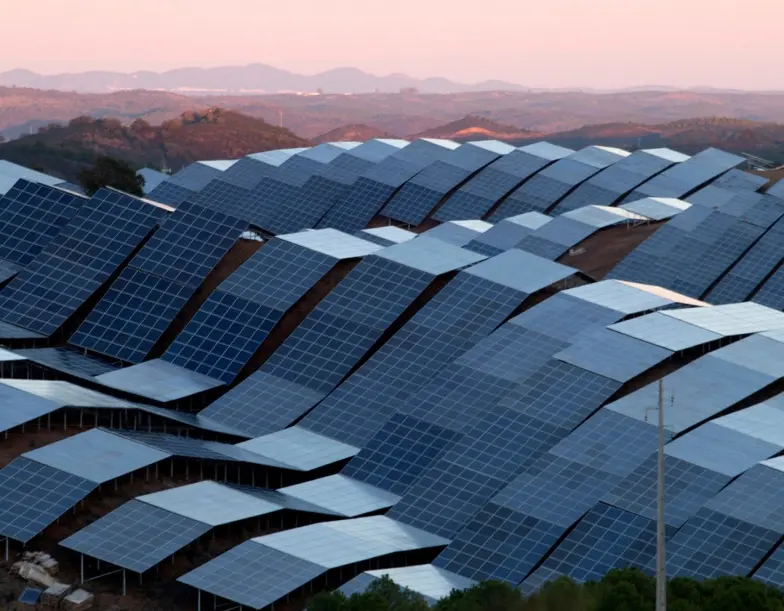Sustainability
Fostering Tomorrow's World
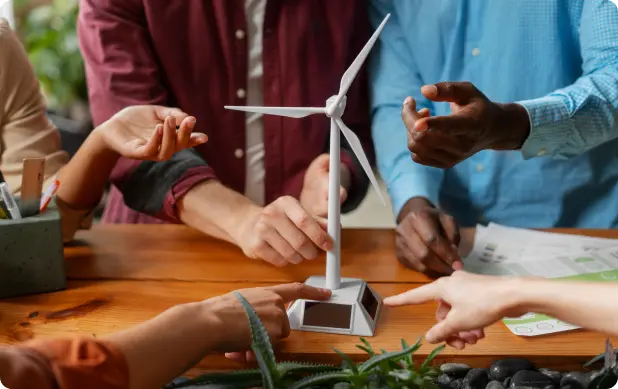

Energy and Emission Management
Avaada strives to maximise the optimisation of strength use and minimise its carbon footprint. We are committed and have implemented a robust energy and emission management approach that prioritizes sustainability, efficiency, and responsible practices. Our strategy encompasses various aspects, including resource optimization, renewable energy deployment, and carbon reduction measures.
We have adopted a dry robotic cleaning system instead of wet cleaning of solar module for water conservation. This system also helped us reduce diesel consumption which was earlier consumed in sprinklers for wet cleaning of modules. The module cleaning system is self-powered and does not draw any power from our solar plant.
Our target is to reach 30 GW of operations by 2030 which will help us avoid 47 million tCO2e per annum. Several of our projects are already approved under globally reputed carbon schemes with many others being under different stages of the approval process.
Reduce Emissions / Energy Consumption
Carbon Sequestration
Water Conservation
Increase Resource Efficiency
Reduce Waste
Optimization & Innovations
Water Conservation
Water is a fundamental component that influences and is influenced by climate change, and it plays a central role in various aspects of human society and the environment. One of the key adaptive strategies involves upgrading and reinforcing infrastructure to enhance resilience and reduce vulnerability to climate-related impacts.
As a water conservation measure, we have designed project layouts that are cost-effective for dry-cleaning systems and accordingly adopted a continuous, long table-type design that is compatible with robotic dry-cleaning systems. Eventually, because of the adoption of a robotic dry-cleaning system, we have reduced water consumption by up to 93%. Additionally, we have built a total of 84 rainwater harvesting structures across our site for water conservation and resource management.
Water is at the heart of climate change adaptation, and addressing water-related challenges is essential for building resilience in the face of a changing climate. Integrating water management practices into broader climate adaptation strategies is key to ensuring the sustainability and well-being of both ecosystems and human societies.
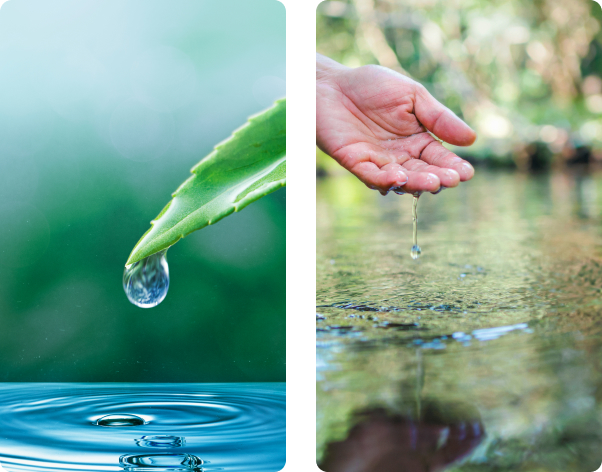

Plantation Drive
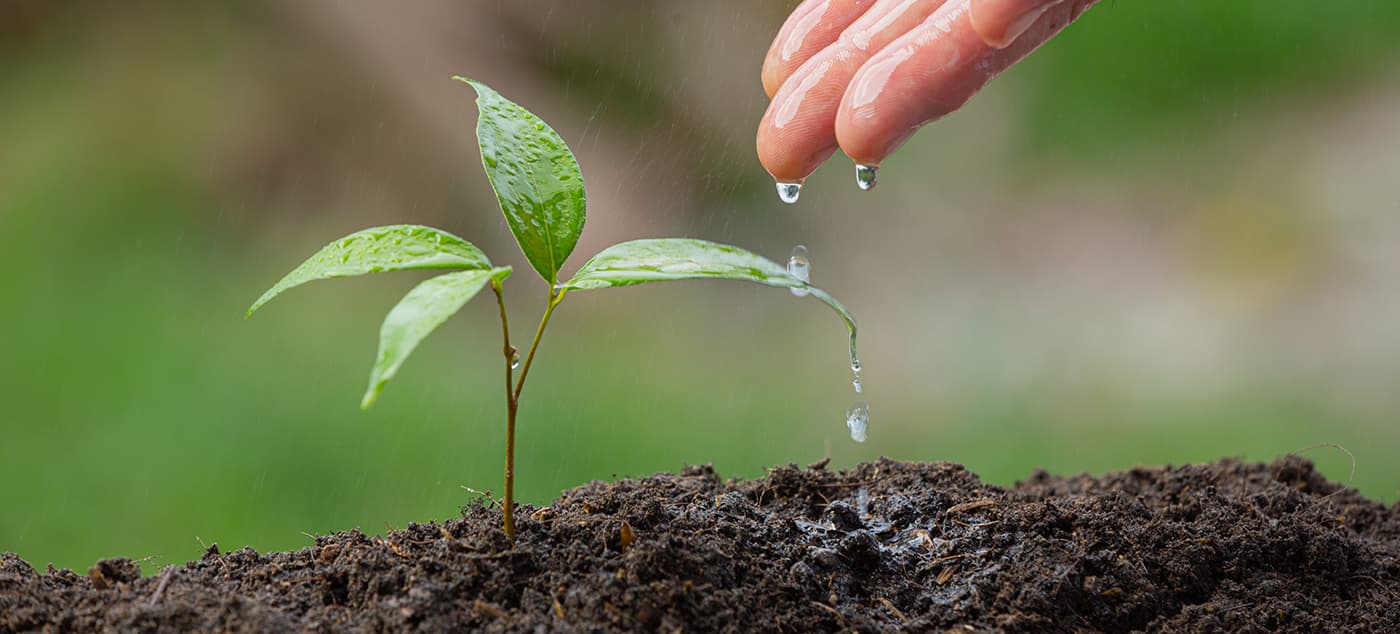

The sustainability of plantations depends on holistic and responsible management practices that consider environmental conservation, social responsibility, and economic viability. Balancing these factors is crucial to ensuring that plantations contribute positively to the well-being of ecosystems, communities, and the planet as a whole.
At Avaada, plantation is an ongoing exercise across all the project sites and nearby communities. We have developed green belts near our plant boundary, also carry out plantation drives by planting saplings, herbs, and trees at both project sites and community levels. Numerous tree plantation efforts have boosted environmental awareness and enhanced green cover.
Our total plantation till date is about 1.42 lacs, covering an area across several states, namely Maharashtra, Rajasthan, Uttar Pradesh, Madhya Pradesh, Karnataka, and Gujarat.
Miyawaki Plantation: We have also adopted the Miyawaki technique for the plantation of native species in and around our operational boundary. This helps us develop a green canopy in a short span of time. By employing responsible site selection, habitat restoration, and Miyawaki plantation techniques, we aim to contribute positively to local ecosystems and foster a harmonious coexistence between renewable energy development and biodiversity conservation.


Environmental Compliance
Environmental compliance is a crucial aspect of good governance, contributing to the effective and responsible management of natural resources. Compliance measures support the development of equitable and sustainable governance by encouraging stakeholder participation, accountability, and transparency.
To competently manage risks, we execute an ongoing compliance management process that monitors and evaluates the systems and processes.
We also have a compliance manager tool that aids in classifying, assigning, automatic detection, and reporting of compliance events.


ENVIRONMENTAL MANAGEMENT SYSTEM - ISO 14001:2015


QUALITY MANAGEMENT SYSTEM ISO 9001:2015


OCCUPATIONAL HEALTH & SAFETY MANAGEMENT SYSTEM - ISO 45001:2018
Waste Management
Effective waste management is crucial for overall environmental health and sustainability. A comprehensive waste management system contributes to resource conservation, pollution reduction, and the promotion of sustainable practices.
Being a renewable energy company, we realise that the criticality of optimizing material consumption is as necessary as our vision to promote sustainability. In accordance with the goals of our environmental management system, Avaada is devoted to decreasing and recycling its waste. Thereby, we make sure that effective procedures are in place to manage waste (solid and liquid) efficiently. We also have a standard operating procedure for waste management, which includes the management procedure for handling and disposing of all types of waste. Packaging materials are stored in a designated area and sold to the local vendor. Further, ‘defunct or damaged solar modules’ are being stored in a designated isolated area in a closed steel container.


Avaada ensures all-inclusive participation of workers and employees through various initiatives/ program like:


- Daily EHS/Safety walkthrough
- Fortnightly Safety Report
- Safe-man hours celebration
- Motivational Safety Program
- National Safety and Electrical Safety Week Celebration
- Cross Functional Internal Audits: Avaada has 46 Internal Auditors as per ISO 9001, 14001 & 45001
- Annual meet of construction manager
- Annual leadership meet.


- External Safety Training
- Annual recognitions and rewards
- Involvement of employees in decision making
- Allocation of responsibilities
- Monthly vendor safety performance evaluation
- Monthly Safety Meet and Monthly employee safety performance evaluation
- Safety Award felicitation - Champion, safety leaders and safety baton holders
- Surprise site visit and safety recognitions
Achieving a safety-perfect culture is a continuous process where there is always scope for improvement. Going beyond compliance, we conduct an external audit of our sites to ensure that all the gaps identified are closed in a timely manner. So that even the lowest-probability risks are mitigated.


No Poverty
- Project-specific CSR strategy considers people below poverty line, enhance their skills and provide livelihood options
Zero Hunger
- Mid-Day Meal programme as part of CSR initiatives
- Direct and indirect employment during entire lifecycle of the project
Good Health and Well-Being
- Constructed toilets in schools
- Women & Healthy baby campaign
- Medical Health Check-up camps for Community and periodic medical health check up of all employees including Mediclaim policy
Quality Education
- As part of CSR initiatives, Shiksha Karmi programme has benefitted 470 children
- E-learning facilities at school
- Providing solar power to schools
Gender Equality
- 282 girls benefitted from Shiksha karmi programme
- Women trained on courses of stitching and digital education
- 544 women have completed the skill development programme Gender Action Plan
Clean Water and Sanitation
- Installed water purifiers and RO in schools and several villages to provide clean drinking water
Affordable and Clean Energy
- Rural electrification-benefitted 634 homes (about 3,100 people) (directly) and 100% of the village indirectly. Provided 49 streetlights in a village
- Access to electricity in two villages in the mountain terrain in northern India
- Commissioned around 4 GW of renewable energy and exported 5160 MUs of net clean energy into the grid
Decent Work and Economic Growth
- 544 women have completed the skill development programme through the Nav Kiran Stitching Centre.
- 528 (343 girls + 185 boys) are certified through the Nav Kiran Digital Computer Centre
- Direct and indirect employment through implementation of affordable and clean energy
- Building a workforce-centric culture through policies and engagement
Industry, Innovation & Infrastructure
- Barren/infertile lands are used for setting up solar PV plants
- Water conservation and optimization through Dry-cleaning Robotics
- Land Optimization through technology updation
- Reduction in raw material requirement
Reduce Inequality
- Skill development programme through the Nav Kiran Stitching Centre.
- Promoting digital literacy through Nav Kiran Digital Computer Centre
- Navkiran beautician and wellness centre
- Our education programs have increased girls’ enrolment in schools
- Diversity and inclusion initiatives have been taken across the organization
Sustainable Cities and Communities
- Launched Community Development Certificate (CDC) campaign with a vision of conducting business for higher purpose
- Goal of commissioning 11 GW of renewable energy by 2026 and 30GW by 2030
- Livelihood generation among communities through our CSR interventions
Responsible Consumption and Production
- Because of adoption of a robotic dry-cleaning system, we have reduced water consumption by up to 93%.
- Energy conservation
- Resource optimization
- Green procurement
Climate Action
- Ideated the Grow Forest Certification Mechanism (GFCM) that encourages the industries, organizations, institutions, individuals etc. to plant trees or grow forests
- Planted 42,000 trees at the project site and distributed among communities under Hug a Tree campaign
- Implementation of 84 Rainwater harvesting structures (RWH)
- Energy conservation by using energy efficient appliances such as energy efficient air conditioner, LED lightings and fans.
- Water conservation and optimization through Dry-cleaning robotics system for solar PV and built rain water harvesting structures
- Our target of 30 GW of operations by 2030 will help us avoid approx 47 million tonnes of CO2 emission reduction
Life Below Water
- Installation of rainwater harvesting systems across our sites to protect local water resources and preserve aquatic ecosystems.
- Through solar power generation, eliminating emissions associated with fossil fuels that contribute to ocean acidification and nutrient imbalances.
- Solar energy adoption reduces greenhouse gas emissions, helping to prevent ocean warming and acidification, thus contributing to healthier marine ecosystems.
Life on Land
- Environmental and Social Impact Assessment study conducted for all the projects
- Avaada's Policy ensures safeguards management of the issues related to water, air, waste management, ecosystem management, biodiversity and natural resource protection, if any.
- Avaada has planted around 50,000 plants across all its project sites
Peace, Justice and Strong Institutions
- Actively working to build peaceful, just, and inclusive societies. Through awareness sessions, we empower women and children with vital knowledge.
- Avaada Foundation imparted various awareness programs on domestic violence, sexual violence, good touch & bad touch etc.
Partnerships with prestigious industry bodies and major associations.
- Partnerships with prestigious industry bodies and major associations.
- We partner across different industry associations like Kite Insights, FICCI, CII, ASSOCHAM and US INDIA.
- Forging partnerships with organizations, governments, and communities to collaborate on environmental initiatives, knowledge sharing, and joint efforts to address pressing environmental challenges.
We are a part of several trade and industrial organizations.We are continuously learning and sharing our experiences with the globe throughour participation in these cross-industry forums for the purpose of constructinga society that benefits everyone.




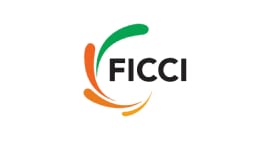





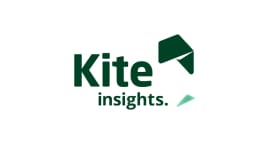

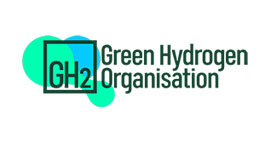

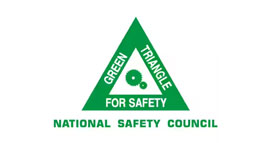

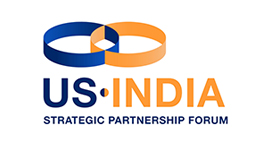

Policies and ethics play a crucial role in promoting sustainable governance, ensuring that decision-making processes, practices, and outcomes align with principles of environmental responsibility, social equity, and economic viability. By incorporating various policies and ethical considerations into governance structures, we have strengthened our commitment to ESG principles and contributed to a more sustainable and responsible business environment.


Ethics
Avaada has a Code of Conduct in place which is applicable to all members of the board of the company, senior management, and all employees. All employees covered by this conduct should fulfill their duties and commitments that support the mission and values in a transparent and ethical manner.
Avaada has an anti-bribery and anti-corruption policy that is applicable to all its employees, officers, directors, and contractors. Every individual to whom the policy applies is bound to exhibit honest and ethical conduct in his or her official/business dealings and relationships, both in letter and in spirit. The policy also entails prohibition of retaliation against any person by any other employee for using appropriate channels to address or report any unethical practices observed. We have a whistleblower policy in place that is applicable to all of our employees. An ethics committee is in place, which consists of the CEO, Head HR, Head Accounts, Head Legal, and a representative from internal audit. This policy further prohibits the company from taking any severe action against employees for disclosing, in good faith, any unethical practices.



